And Compassion for All
We're in this American experiment together. It's time to bring some real empathy into the world.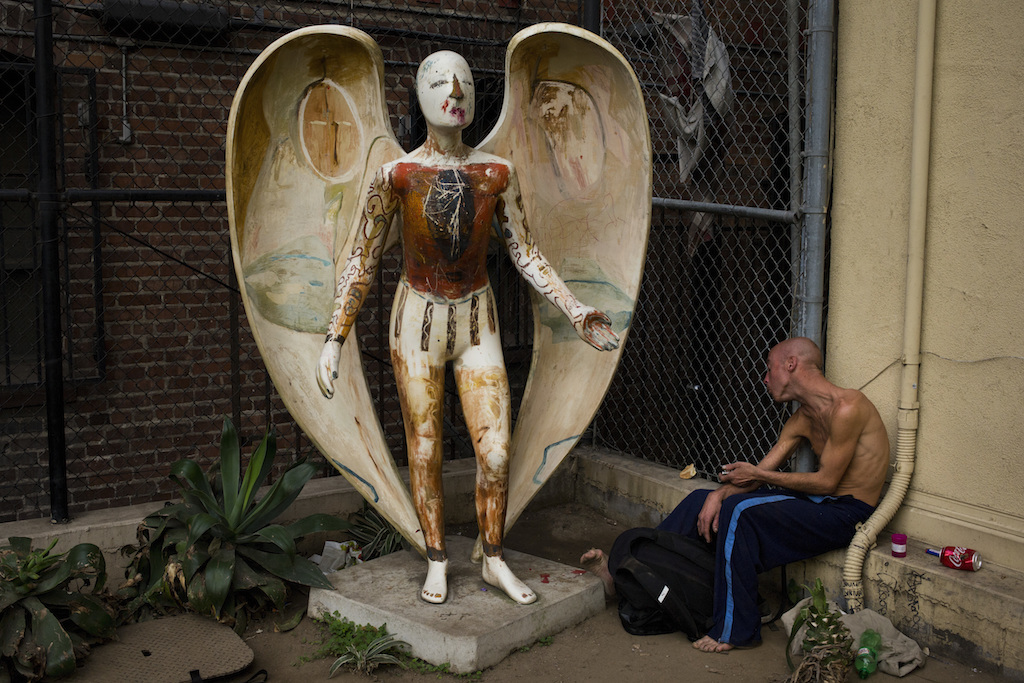 A homeless drug addict injects himself with heroin next to an angel statue in the skid row area of downtown Los Angeles. (Jae C. Hong / AP)
A homeless drug addict injects himself with heroin next to an angel statue in the skid row area of downtown Los Angeles. (Jae C. Hong / AP)
Are you hopeful? It’s a simple question without a simple answer in these uncertain times.
But Sarah Silverman did something cool to end 2017 that should provide some hope. After encountering a troll on social media who called her the C-word, she showed compassion.
I believe in you. I read ur timeline & I see what ur doing & your rage is thinly veiled pain. But u know that. I know this feeling. Ps My back Fucking sux too. see what happens when u choose love. I see it in you.
— Sarah Silverman (@SarahKSilverman) December 29, 2017
I can’t choose love. A man that resembles Kevin spacey took that away when I was 8. I can’t find peace if I could find that guy who ripped my body who stripped my innocence I’d kill him. He fucked me up and I’m poor so its hard to get help.
— Jeremy jamrozy (@jeremy_jamrozy) December 29, 2017
No I just smoke weed. I’m prescribed medications which I take accordingly
— Jeremy jamrozy (@jeremy_jamrozy) December 29, 2017
I will go. But I trust no one I’ve been burned so many times. I’d give the shirt off my back and everytime I get burned. I’m super antisocial. I have no friends. I’m sorry I gave u shit.
— Jeremy jamrozy (@jeremy_jamrozy) December 29, 2017
Im so psyched you’ll go. KEEP ME POSTED. Don’t give up on yourself. Be brave enough to risk getting burned. It’s what happens when u fight for yourself. But it’s worth it. I promise.
— Sarah Silverman (@SarahKSilverman) December 29, 2017
Silverman then used her platform as a celebrity to put out a request to help Jeremy, her new friend.
Yo SAN ANTONIO! Any kickass back/neck care specialists willing 2 help my friend @jeremy_jamrozy He has several slipped discs, no insurance, & can’t work bc of severe pain. Let’s get him back on his feet!! Who’s in?
— Sarah Silverman (@SarahKSilverman) December 29, 2017
I was their Director of Finance for 6 years and my sister is a CRS there @lmarti25 I’ll get her to reach out to him to get him in!
— Jen Carriedo (@jcarriedo) December 29, 2017
Jeremy started a GoFundMe page to raise $150 for back pain relief and was overwhelmed by the generosity of complete strangers.
I’m raising money for For back pain relief. Click to Donate: https://t.co/IXZrnlINi9 via @gofundme
— Jeremy jamrozy (@jeremy_jamrozy) January 2, 2018
I love all the support the love. I love it so much I just want to give more love back u people r amazing
— Jeremy jamrozy (@jeremy_jamrozy) January 1, 2018
He ended up raising close to $3,000.
Thank u everyone that helped me out I reached my goal. Plz pay it foward to others. Again I don’t need any more money plz give or help others. Thank u all.
— Jeremy jamrozy (@jeremy_jamrozy) January 3, 2018
Thank you to all the support financially, emotionally, and donations. This is more than I could have wished for. Thank you nicos organics I received ur package am excited to try the products out. Thank u everyone. U showed me a lot within a few days. Love u all
— Jeremy jamrozy (@jeremy_jamrozy) January 5, 2018
While Jeremy’s story—and pain—isn’t over, he has a new outlook on life thanks to a random act of kindness.
You know its fucked up I’m in pain serious my nuts hurt as a result I’m slouched im over and yet sum asshole is trying to come after medicines I need from doctors and marijuana wtf is going on here. U lawmakers are not thinking looks like ima halve to just deal with it. Ty trump
— Jeremy jamrozy (@jeremy_jamrozy) January 7, 2018
God I feel so overwhelmed with joy tears in my eyes because I’m finally getting the help I need. Sarah Silverman is a complete angel. I’m in shock man shit like this never happens. I won’t take it for granted
— Jeremy jamrozy (@jeremy_jamrozy) December 29, 2017
It anymore people are going to write shit bout wut nice things happend wit auntie Sarah please note im not a trump supporter or a Democrat supporter I choose no sides. Damn y is there politics being thrown in wit such a nice story of compassion? WTF
— Jeremy jamrozy (@jeremy_jamrozy) December 30, 2017
Congress is to busy taking breaks. Its time to let our differences go and realize our similarities. Plz help so this year can be beautiful thanx again
— Jeremy jamrozy (@jeremy_jamrozy) December 31, 2017
I know that a pay if foward campaign sounds a lil cheesy but Goddamn even the bloods and crips had a truce and peace and love for each other at some point.
— Jeremy jamrozy (@jeremy_jamrozy) December 31, 2017
Happy new years plz pay it foward this year. Lets spread a movement of love and compassion this year.
— Jeremy jamrozy (@jeremy_jamrozy) January 1, 2018
America has many people like Jeremy today. They are wounded and insecure and express themselves through anger and rage. Silverman’s interaction with Jeremy was not a stunt. She realizes the way to reach wounded people in our hyperpoliticized age is through empathy. By listening to their needs and understanding them—engaging in dialogue, not diatribe—we can find common ground and perhaps even solutions.
Silverman can envision a better America. It’s why she started “I Love You, America,” a Hulu series where she travels around the country “looking to connect with people who may not agree with her personal opinions through honesty, humor, genuine interest in others, and not taking herself too seriously. While it’s great to connect with like-minded people, Silverman feels it’s crucial, now more than ever, to connect with the un-like-minded.”
One of the people Silverman met along her journey was Father Greg Boyle, the executive director of Homeboy Industries, a gang prevention and rehabilitation program in Los Angeles. Boyle planted the seeds of Homeboy Industries in 1988 with “Jobs for a Future” at Dolores Mission in the Boyle Heights area, east of downtown Los Angeles. The idea was to help gang members improve the community through jobs and education rather than suppression and incarceration. Thirty years later Boyle, known as Father G, is still helping gang members, and Homeboy Industries has grown into a multimillion-dollar nonprofit organization in Los Angeles that provides jobs, training and support for at-risk youth, former gang members and previously incarcerated men and women.
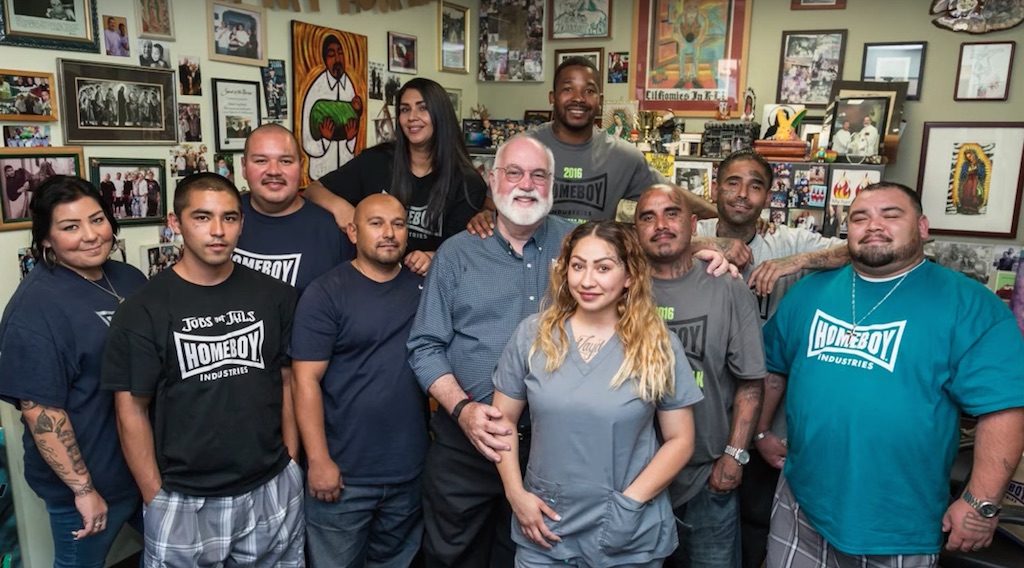
Radical kinship is a foundational principle of Homeboy Industries, and the subject of a new book by Boyle called “Barking to the Choir: The Power of Radical Kinship.” The same concept could put America on a healing path.
“All the things we want in this country and the things we want to struggle for—peace, justice and equality—are really byproducts of our kinship. No kinship, no peace. No kinship, no equality. And no kinship, no justice,” said Boyle. “No matter how singularly focused we might be on those worthy goals, unless we stand against forgetting that we belong to each other, that there is no us and them, and that’s the point of kinship. So Homeboy Industries tries to be what we think the world is invited to become, which is a community where everybody belongs.”
The “community relations coordinator” put his arm around the “madman” and took him outside the building.
“How about I take you to get some tacos?” said the security chief.
The man pulled up his shirt and showed a gun in his waistband. “How about I put a bullet in your head,” he said.
“Do you want two or three tacos?” responded the security chief.
They walked to Olvera Street, and the security chief bought the man some tacos. The man threw the first taco on the ground, and then he ate the other two.
“I hear two voices in my head,” said the man. “One is telling me to kill you. The other is saying, ‘He’s cool. Stop tripping, he’s being kind to you.”
“Only the soul that ventilates the world with tenderness has any chance of changing it,” Boyle concludes.
Boundless compassion is the centerpiece of Boyle’s message, but he’s learned that you can’t “save” anyone.
I don’t believe in mistakes. Everything belongs, and, as the homies say, “It’s all good.” I do believe in lessons learned. I have learned that you work with gang members and not with gangs, otherwise you enforce the cohesion of gangs and supply them oxygen. I know now that gang warfare is not the Middle East or Northern Ireland. There is violence in gang violence but there is no conflict. It is not “about something.” It is the language of the despondent and traumatized.
In my 30 years of ministry to gang members in Los Angeles, the most significant reversal of course for me happened somewhere during my sixth year. I had mistakenly tried to “save” young men and women trapped in gang life. But then, in an instant, I learned that saving lives is for the Coast Guard. Me wanting a gang member to have a different life would never be the same as that gang member wanting to have one. I discovered that you do not go to the margins to rescue anyone. But if we go there, everyone finds rescue.
America needs a life preserver. Liberty and justice for all are not the reality of today’s America. The system is still rigged against minorities, particularly blacks and Latinos, who are still moved to the bottom of lists. The government has failed and continues to fail the people, and the failure is by design. According to Nancy MacLean, author of “Democracy in Chains: The Deep History of the Radical Right’s Stealth Plan for America,” in an interview with Salon, radical far-right forces are working to destroy “the model of government that has prevailed in the United States and in many other countries for a century.” This new vision of America wants to undo all semblance of democracy—removing government responsibility for education, health care, food, housing, old-age support—to line the pockets of a wealthy few.
MacLean explained:
I think that what we need to convey to people is that this is a messianic cause, with a vision of the good society and government that I think most of us would find terrifying, for the practical implications and impact that it will have on our lives.
We are at a crucial moment in our history, and we will not get another chance, by this cause’s own telling. They say again and again that this is going to be permanent, and they’re very close to victory. So I think we need to be really clear-eyed about understanding this and reaching out to one another without panic.
… [T]he Koch network and all of these people are doing what they’re doing because they understand that their ideas make them a permanent minority. They cannot win if they are honest about what they’re doing. That’s why they’re doing things in the deceitful and frightening ways that they are.
And that, I think, is a sign of great power for the majority of people, who I think are fundamentally decent, and agree on much more than we’re led to believe.
The trouble is, the assault on democracy with Donald Trump in the White House is also coming from Democrats, who have moved to the right under the influence of financial elites to create what Paul Street calls the “nauseating nothingness of neoliberal capitalist and professional class politics.”
Thomas Frank said as much in the new afterword of his book “Listen Liberal: What Ever Happened to the Party of the People?”:
There was brilliance in the billionaire’s bluster. By denouncing free trade and the culture wars, [candidate Trump] was dynamiting the consensus orthodoxy that had dominated Washington for many years. This orthodoxy had, among other things, made possible endless sell-outs of working people by Democrats, who could savor their Tom Friedman columns and celebrate globalization’s winners and still count on the votes of the angry working class because such people had ‘nowhere else to go.’ Clintonism would only work, however, as long as Republicans did their part and adhered to free-market orthodoxy. Take that consensus away and leave the Democrats as the only party of globalization, and they would immediately be exposed to a working-class revolt within their ranks. … Trump was openly calling for such a revolt.”
That revolt has yet to happen. Trump has grown the swamp in Washington, D.C., instead of draining it. At the same time, he and his administrative tyrants have set out to destroy all sense of American humanity and the multicultural, “nation of nations” fabric and spirit upon which our country was founded.
The ruling class wants to keep American citizens divided. That’s why we keep seeing policies opposed to what the majority of Americans want, with little substantive analysis of those policies. Instead, we get an abundance of “soap opera” news and “worldwide wrestling” narratives. Sensationalism sells. The rubes stay distracted and uninformed. The ruling class wins. All they care about is power and money. Anything or anyone that runs counter to making money or maintaining power is the enemy.
Our current government has no empathy because its political donors lack empathy. They don’t care about immigrants, economic equality, the poor, the middle class, the environment or peace—what a majority of Americans care about—because human rights, civil rights and decency are bad for business.
Change in America is going to happen from the bottom up, not the top down. Forget about political labels like Democrat and Republican. Those are identity tools to keep the masses in echo chambers. The status quo is not working for many Americans. People are hurting.
How can we ease the pain? Yelling at the perceived opposition is not going to bring us any closer to disrupting the status quo. We do not have time to wait for President Oprah to lead the way or save the day. One person does not hold the magical cure.
We the people are the answer. We are the saviors. We must open our hearts to the needs of others—the poor, the sick, the elderly, immigrants, refugees and the homeless—and start treating them like brothers and sisters. We can start by being more compassionate with the people closest to us: our families, friends, co-workers and neighbors. Then, we can start practicing random acts of kindness with strangers.
Unplug. Look people in the eye. Shake hands. Listen. Give a damn. Practice compassion. Be authentic. Show up. Keep showing up. Organize. Mobilize. This is grass-roots problem-solving and community building. This is how we are going to restore humanity.
Anyone who cares about the future of America, the world and planet—our future—can do this.
Rivals can come together and make a difference.
Not everyone has the reach of Sarah Silverman or Father Greg Boyle, but everyone is a human being. And every human being has the capacity for compassion. Anyone can be a human for others—a compassionate force for good. Showing compassion is a choice. Anyone can choose to be a little more caring, a little more kind, a little more understanding, patient and forgiving.
Compassion is a sign of strength and takes work, but the freedom from suffering compassion brings is worth the effort.
Ironic, but one of the most intimate acts of our body is death.
So beautiful appeared my death—knowing who then I would kiss, I died a thousand times before I died.
“Die before you die,” said the Prophet Muhammad.
Have wings that feared ever touched the Sun?
I was born when all I once feared—I could love.
We’re all in this American experiment together. Imagine a circle of compassion and then imagine nobody standing outside that circle. There is no us and them. Just us. It’s time to start acting and treating others the way they want to be treated.
No kinship, no peace.
No kinship, no equality.
No kinship, no justice.
It can’t hurt.
Your support matters…Independent journalism is under threat and overshadowed by heavily funded mainstream media.
You can help level the playing field. Become a member.
Your tax-deductible contribution keeps us digging beneath the headlines to give you thought-provoking, investigative reporting and analysis that unearths what's really happening- without compromise.
Give today to support our courageous, independent journalists.

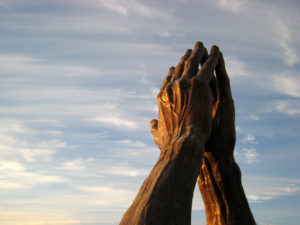
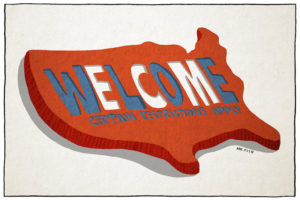


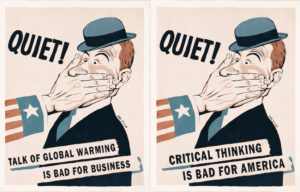


You need to be a supporter to comment.
There are currently no responses to this article.
Be the first to respond.